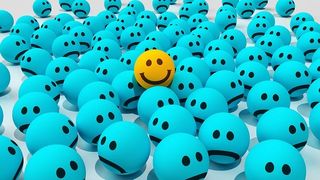Happiness
How to Buy Happiness and Health
The greatest possessions in life do not accept cash or credit.
Posted November 29, 2019 Reviewed by Gary Drevitch
As we enter the time of year most focused on material possessions, it is important to remember that life’s most valuable “possessions”—such as happiness, health, and love—have no price tag. The roots of this wisdom run as deeply as the Bible, as broadly as philosophies from ancient civilizations, and as eloquently as the works of Shakespeare.
Sometimes, the limitations of money have even been expressed with a sense of humor. “You can’t buy love,” wrote the 16th-century poet Christopher Marlowe, “but it improves your bargaining position.” Groucho Marx said, “While money can’t buy happiness, it certainly allows you to choose your form of misery.” The Chinese philosopher Lao Tzu recognized that health was our “greatest possession” more than 500 years before the birth of Christ. Yet two millennia later, health, happiness, and love remain unavailable on Amazon, E-Bay, or any other 21st-century marketplace.

The refreshing truth, however, is that happiness, health, and love have always been available for purchase, even by those with limited financial resources. This apparent contradiction with the conventional results entirely from the limited way we are taught to think about resources such as money and the process of buying valuables. Somewhere along the way, in the upbringing of a child, they are usually taught the narrow perspective that things of value can be purchased only with money.
Money, it must be stated, can purchase many things. For the valuables for which money is useful, in fact, there is no better currency. Unfortunately, the implied message is often that money is the resource with which we should expect to obtain all the valuables in life. This erroneous belief produces much disappointment, frustration, and heartbreak.
In truth, money is merely one resource we exchange for valuables. And it is critical that we learn how to match our resources to our valuables. It probably seems absurd, for instance, to use a single resource, such as food, to eat, drink, and breathe (Breatharians notably excepted). Food, like money, is irreplaceable as a resource for certain valuables yet of little or no value for others.
Such examples make it clear that different resources are required to obtain different results. However, it somehow doesn’t strike most people as absurd to use a single resource such as money to obtain happiness and health alongside their new 4K TV. Happiness and health can be purchased; they simply require that you be willing to exchange for them resources even more precious than money.
What are these alternative resources? The complete list is long, but it is headed by time, effort, and a willingness to expand ourselves. Similar to money, we each possess a finite amount of these resources. The interesting feature that is exclusive to these kinds of nonmonetary resources, however, is that they are divided equally among us.
In contrast to debates over income inequality, for example, no person possesses more time in their day than another. Consider that each second, moment, and hour of your day are a form of currency, like the penny, dime, and quarter equivalents of time. These daily coins can be spent any way you choose, but they must be spent before they vanish with the new dawn. Spent wisely, the resources of time and effort can be exchanged for the specific types of knowledge, attitudes, and skills that form the foundation of happiness and health.
In the same way that a person seeking financial success must evolve into an improved version of themselves who uses their money more skillfully, a person desirous of happiness and health must likewise evolve to make more skillful use of their time and effort. The formula is the same, even if the resources and the goals are different. So, the next time you hear someone complaining that money can’t buy happiness, perhaps you can suggest that they try using a better currency.


